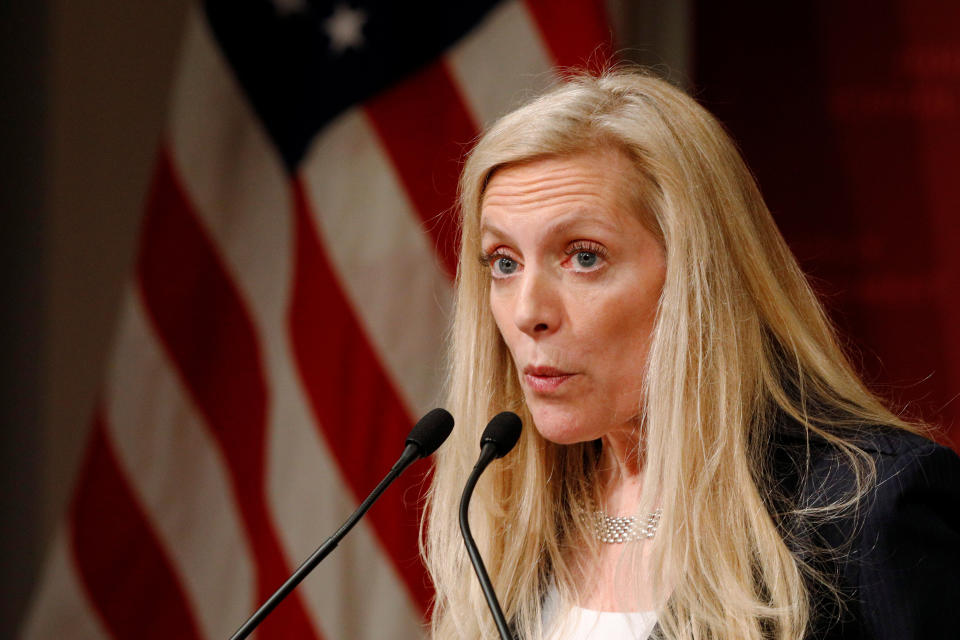Lael Brainard: Regulators may be 'whittling away' at financial stability
Federal Reserve Governor Lael Brainard said Wednesday that she is concerned that regulators may be “whittling away” at key financial stability measures by paring back post-crisis regulations. As the economic recovery creeps closer to earning the title of longest-on-record, Brainard also reiterated her worry that leveraged loans could bring the good times to an end.
In an exclusive interview on Yahoo Finance on Wednesday, Brainard said she is closely watching for risks to the banking system that could expose the government to another bailout, which would put “taxpayers on the hook.”
Although Congress passed legislation in May 2018 mandating that the Fed and other bank regulators reduce regulatory requirements on some portions of the banking industry (mostly smaller banks), Brainard has said she is worried that the Fed may have gone too far in extending those relief efforts to banks far larger in size.

“It's really in areas where we've gone beyond those statutory changes that I am concerned that we may be whittling away at that core resilience of our financial system,” Brainard told Yahoo Finance at the Fed Listens conference in Chicago.
For example, Brainard dissented on a decision to reduce the frequency for large banks to submit a “living wills” plan that details how a bank would wind down its assets in the event of financial distress or failure. The exercise is designed to make sure banks are able to address insolvency without triggering other failures throughout the rest of the banking industry.
Brainard voted against the proposal to reduce the annual submission to every four years for the largest banks — including JPMorgan Chase (JPM) and Bank of America (BAC) — and claimed that the change would “weaken protections that are vital to a safe and sound financial system.”
In addition to the living wills dissent, Brainard also disagreed with the board’s decision not to activate the countercyclical capital buffer, a temporary increase in capital requirements when an economy is at risk.
Brainard, the only sitting board member not to have been nominated to the Fed by President Donald Trump, has totaled five dissents in just the last year, making her an outlier on a Fed board that has largely expressed sympathy for tweaking post-crisis rules that some feel may have gone too far. Randal Quarles, who joined the board in October 2017, has largely spearheaded the regulatory changes at the Fed, arguing that the post-crisis framework would benefit from tailoring the rules to the different business models of different types of banks.
Leveraged loans
Although many Fed officials have called attention to the risk of leveraged loans, Brainard has made a point of calling for increased scrutiny on companies that may be juggling more debt than they can handle.
In a leveraged loan, a company with poor credit will take on a large sum of debt to make a large investment (like a merger) and repay the loan on future earnings.
In a post-crisis period of historically low rates, companies found leveraged loans an extremely attractive source of funding. In that time, the leveraged loan market has surged past the $1 trillion mark. Overall, non-financial companies are holding record levels of debt relative to GDP.

Brainard told Yahoo Finance Wednesday that the Fed has flagged it as a risk in this current cycle, worrying that the heavy levels of corporate debt could exacerbate the next crisis.
“As we know, when there is a recession, it's precisely the riskiest corporate borrowers that do the greatest layoffs, that pull back on production, that pull back on investment,” Brainard told Yahoo Finance. “So they tend to be an amplifier of the business cycle.”
The central bank’s biannual report on financial stability has cited leveraged loans as a risk, but Brainard and other Fed members have shied away from calling for any regulatory response. Some would prefer that the Fed be more proactive; former Federal Deposit Insurance Corp. Chair Sheila Bair has advocated for caps on the debt-to-EBITDA structure of leveraged loans, among other recommendations.
—
Brian Cheung is a reporter covering the banking industry and the intersection of finance and policy for Yahoo Finance. You can follow him on Twitter @bcheungz.
Lael Brainard: There's 'no destination point' for full employment
Lael Brainard: Fed 'prepared to adjust policy' as trade concerns mount
Questions loom over Fed efforts to make sure the 'roof isn't leaking'
Fed: Tight labor market 'did little' to narrow economic disparities
Congress may have accidentally freed nearly all banks from the Volcker Rule
Read the latest financial and business news from Yahoo Finance
Follow Yahoo Finance on Twitter, Facebook,Instagram,Flipboard,SmartNews,LinkedIn, YouTube, and reddit.
